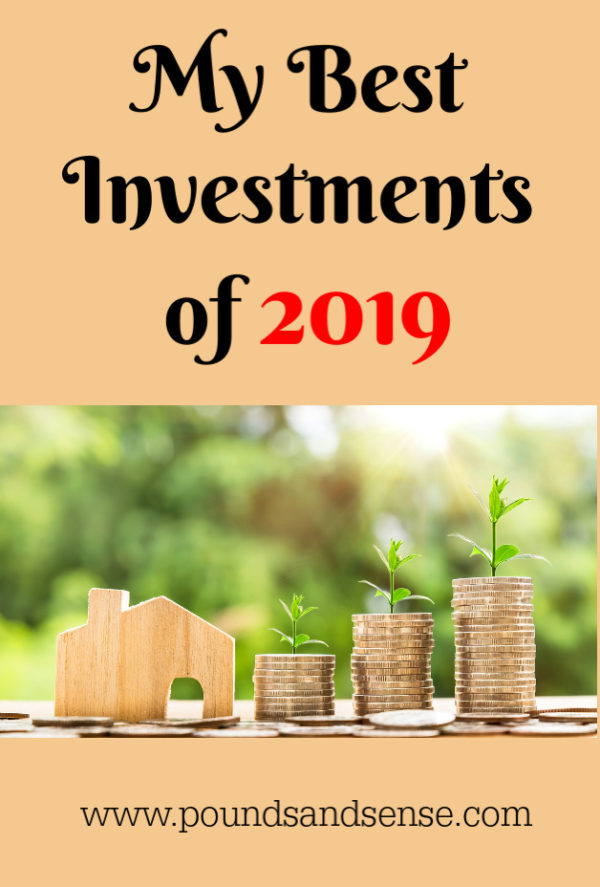My Best Investments of 2019
One question I get asked fairly frequently as a money blogger is what I think are the best current investment opportunities.
I have to be very careful when responding to this sort of question (and always tell people this). For one thing, I am not a qualified financial adviser, so it would be against the law for me to offer personalized investment advice. And even if I were, I still wouldn’t be allowed to give one-to-one advice without first doing an in-depth fact-find on the person in question.
Of course, this is exactly as it should be. For one thing, everyone’s circumstances are different, and what represents a good investment for me might not be the same for you. It depends on a wide range of factors, including your income and expenditure, your family responsibilities, how much you want to invest, the timescale (and purpose) you are investing for, your age and health, and so forth.
Another important consideration is your attitude to risk. Other things being equal, higher returns come with higher risks. If you’re comfortable with this and willing to accept it in exchange for the chance of better returns, that is of course your decision. On the other hand, if riskier investments would cause you sleepless nights, you are probably better off seeking a safer – if possibly less exciting – home for your money.
In addition, anything I say here is inevitably based on my own experience, and there is no guarantee yours will be the same as mine. I might, for example, have great success with one platform and suffer losses on another. But there is no way of knowing whether your experiences if you invest will be the same as mine. This applies especially if you have to choose specific investments on the platform (as with many P2P/property crowdfunding platforms) rather than putting your money into a pooled fund of some kind.
And, of course – as the financial services ads always say in the small print – past results are no guarantee of future performance…
I don’t want to come across as too negative. I am, after all, a money blogger and investor myself. So what I can – and will – do is talk about my own investing experiences and share information about what has worked well for me this year. It’s then up to you to decide if you want to investigate these opportunities any further. If so, you will need to do your own ‘due diligence’ before deciding how to proceed, perhaps taking professional advice from a qualified financial adviser as well (which I strongly recommend if you are new to investing or at all uncertain).
- Although I count myself as a reasonably experienced investor, I do still have an independent financial adviser (Mike from Integrity Wealth Solutions). He oversees about half my investments, while the other half I look after myself. He also advises me on my financial situation more generally and answers any questions I can’t answer satisfactorily myself. i will talk more about this in another post. But I wanted to mention it here to show that I am not at all opposed to using a financial adviser and in general recommend it, particularly when starting out in investing.
My Best Investments of 2019
Below I have listed some of my investments that have performed best this year and/or caused me the least stress and hassle! I have included a few lines about each one, and links to any blog posts I have written about them for further info.
(1) Nutmeg
Nutmeg is a robo-advisory platform. I have used it for my Stocks and Shares ISA investments over the last three years. My investment pot has grown steadily, albeit with a few ups and downs, as is to be expected with equity-based investments. At the time of writing my Nutmeg pot has grown by about 40% since i started investing in April 2016, which is certainly a lot better than I could have achieved with a bank savings account. Of course, you shouldn’t normally invest in any equity-based product with anything less than a five-year timescale.
Nutmeg use exchange-traded funds (ETFs) as their investment vehicle. These are discussed in more detail in my in-depth Nutmeg review, which also includes details of what I invested with them and when. Note that my investment has grown by a further £1,100 since that article was published.
(2) Ratesetter
Ratesetter is a P2P lending platform. They don’t pay the highest rates, currently ranging from 3% for instant access to 4% for their Max account (where you pay a release fee of 90 days’ interest if you wish to withdraw). Though better than most bank savings accounts, those rates are clearly nothing spectacular.
One thing I particularly like about Ratesetter, though, is that they have a provision fund that effectively covers investors against defaults. That means you don’t have to worry about diversifying your investments across a range of loans, as is the case with some other P2P lending platforms. Of course, if the whole platform were to collapse the provision fund wouldn’t necessarily save you, but Ratesetter has been going for ten years now and appears professionally and competently run. It has delivered the promised returns to me with no stress or hassle, and I am happy to recommend it based on my experience.
In addition, if you check out my Ratesetter review you can discover how to get a free £20 bonus if you invest a mere £10 with them.
(3) Buy2Let Cars
I took a long time before deciding whether to invest with Buy2Let Cars, as it is quite an unusual investment. Basically what you are doing is putting up the money to buy a car for someone in a responsible job who can’t afford to buy one outright themselves. You then receive monthly repayments over a three-year period, and a final repayment of capital plus interest at the end of the loan. The minimum investment is £7,000, so this is obviously not going to work for everyone. Personally I bought one new car at a price of £14,000 in March 2018. Since then I have been receiving £250 per month in repayments, with a final payment of £8,429 due in month 37. That will give me a total net profit of £3,429 based on an annual interest rate of 10% (the rates on offer can vary but once you have signed an agreement the rate is fixed for the duration of the contract).
There are – of course – various safeguards and protections in place, fully discussed in my Buy2Let Cars review. Buy2Let Cars say that to date they have a 100% repayment record to investors, which appears to be confirmed by their Trust Pilot reviews. This investment has been working very well for me, with payments turning up in my bank account every month like clockwork. I am currently semi-retired, so it is providing a useful extra monthly income for me, with a large lump sum due in 2021, just a few months before I qualify for the state pension 🙂 If you think it might work for you, I recommend checking out my Buy2Let Cars review and speaking to my contact there, Brett Cheeseman, who helpfully answered all the questions I had at the time I invested.
(4) Kuflink
Kuflink offer the opportunity to invest in loans secured against property. These loans are typically made to developers who require short- to medium-term bridging finance, e.g. to complete a major property renovation project, before refinancing with a commercial mortgage.
Kuflink don’t pay the highest rates in this field – their loans are typically at an interest rate of around 7% – but in my view they offer a fair balance between risks and rewards. One thing I like about them is that interest is paid into your account monthly on all loans. I only have a relatively small amount invested, but so far everything has been going well with just the occasional short delay in repayment of capital.
Kuflink currently have a generous welcome offer, with cashback of up to £4,000 for new investors. Take a look at my Kuflink review for more information about this.
(5) Crowdlords
Crowdlords is a property crowdfunding platform. I have been investing with them almost since their launch and have made a good overall profit. Crowdlords pay competitive interest rates (over 20% in some cases) and offer a choice of equity and debt investments. Equity investments are higher risk than debt ones, but offer the potential for bigger returns if all goes well.
My only reservation about Crowdlords is that I currently have two overdue investments with them. In both cases, though, I have received full and reasonable explanations for the delays, and have been told that the money should be in my account within the next few months. Obviously, if that doesn’t happen, I will let Pounds and Sense readers know.
Crowdlords doesn’t have a welcome offer as such, but they do have a Refer a Friend scheme. If you sign up quoting my code, I will share the commission I receive 50:50 with you. Please see my Crowdlords review for more information about this.
So those are the investments that have given me the best returns and/or least stress during 2019. I do have others as well, including Primestox, ZOPA, Bricklane, The Lending Crowd, The House Crowd and Property Partner. Most of these have still made some money but none has really set the world alight.
Only Primestox actually lost me money. This is (or was) a premium food investment platform. They started promisingly and I made good returns on my early investments, but then they were hit by a series of delays and defaults. This happened with three projects I invested in. In the case of two I have received partial repayments with more promised, but in the third I have probably lost my £500. Primestox are no longer advertising investment opportunities, and I assume are re-evaluating their business model.
Property Partner is an interesting case. I have made modest returns on my portfolio this year, partly due to the fact that the property market in general has been in a slump. That said, there haven’t been any issues with delays or defaults, and dividends have been credited to my account every month as promised. It will be interesting to see what happens in 2020 as properties come up to their five-year anniversary and investors have the opportunity to exit at the current market price. As I noted in this recent blog post, this has the potential to create opportunities for both buyers and sellers.
I haven’t included certain other investments in this article. These include my Bestinvest SIPP, which is now in drawdown and holding up well in value. Neither have I included money invested via my financial adviser. This is mostly in funds from Prudential, which again are doing pretty well.
Lastly, I haven’t included the money I ‘invested’ in Football Index. My portfolio has more than doubled in value over 18 months, so in some ways it is my most successful investment of 2019! I am sure luck has played a significant part in this. Nonetheless, if you want to know more about Football Index – and read how you can get a risk-free £50 when signing up – you might like to check out this recent blog post.
I hope you have enjoyed reading this article, which has run on a bit longer than I expected. I hope also it may have given you a few ideas to investigate further if you are in the fortunate position of having money to invest.
As always, if you have any comments or questions about this article, please do post them below.
Disclaimer: As stated above, I am not a professional financial adviser, and nothing in this article should be construed as personal financial advice. You should always do your own ‘due diligence’ before investing, and seek advice from a qualified financial adviser if in any doubt how best to proceed. All investment carries a risk of loss.





